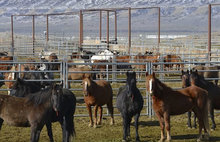The American Wild Horse Preservation Campaign is calling foul on the Bureau of Land Managementâs just-released 2017 budget proposal, which includes a provision that would strip wild horses of the legal status that currently protects them from being sent to slaughter. The BLMâs budget is a marked departure from President Obamaâs longstanding support for safeguarding wild horses from possible slaughter.

Wild horses in BLM holding pen
The provision would make wild horses available for transfer to state and local authorities, many which have publicly called for wholesale slaughter and once transferred, the horses would lose their protected wild status, meaning that authorities could sell them for slaughter.
© 2016 by American Heritage Mustang Foundation
The provision at issue would make wild horses available for transfer to state and local authorities, many of which have publicly called for the wholesale slaughter of these cherished American icons. Once transferred, the horses would lose their protected âwild status,â meaning that state and local authorities could sell them for slaughter.
âThe proposed 2017 budget opens the door to slaughtering Americaâs magnificent wild horses by essentially laundering the horses through state and local authorities,â said Suzanne Roy, Executive Director of AWHPC. âThis is an end run around Congressional prohibitions and the will of the people, who strongly support protecting Americaâs cherished wild horses on public lands in the West.â
The BLMâs â2017 Budget in Briefâ also indicates that agency will pursue highly controversial spaying and gelding (castrating) of wild horses in direct contradiction to recommendations by the National Academy of Sciences for improvements to the BLM wild horse program. Experts state that spaying and gelding wild horses will strip them of their natural free-roaming behaviors, which are the essence of what makes them wild and distinguishes them from domestic horses.
Recently, 21,000 citizens weighed In with public comments against the agencyâs plan to conduct dangerous and invasive sterilization experiments on wild mares held at the BLMâs corrals near Burns, Oregon. The commenters demanded that BLM utilize an available, humane and scientifically proven wildlife contraception vaccine as an alternative to invasive and risky sterilization procedures.
âThe BLM is taking the wild horse program in an increasingly dangerous direction that is directly counter to scientific recommendations and the wishes of the American public,â continued Roy. âWe need leadership from Congress to stop federal mismanagement of the wild horse and burro program and bring it in line with good science and the will of the people.â
AWHPC also challenged the Administrationâs claim regarding the âunsustainable proliferation of wild horses and burros on public lands,â noting that these animals are present on just 12 percent of federal rangelands, and are vastly outnumbered by cattle and sheep.
AWHPC noted that national opinion polls show the vast majority of Americans oppose horse slaughter and support protecting wild horses on public lands.
The American Wild Horse Preservation Campaign is a national organization dedicated to preserving Americaâs iconic wild horses and burros in viable, free-roaming herds for generations to come, as part of our national heritage. AWHPCâs mission and grassroots advocacy efforts are endorsed by a coalition of more than 60 horse advocacy, public interest, and conservation organizations.
MORE INFO:
President's Interior budget request Section 110 states, â... the Secretary of the Interior may transfer excess wild horses or burros that have been removed from the public lands to other Federal, State, and local government agencies for use as work animalsâ¦[and] ⦠That any excess animal transferred under this provision shall lose its status as a wild free-roaming horse or burro as defined in the Wild Free-Roaming Horses and Burros Actâ¦â
BLM Budget in Brief: âThe BLM will also continue expanding the use of contraceptives and the application of spay and neuter to begin to reduce program costs and help the unsustainable proliferation of wild horses and burros on public lands.â
The National Academy of Sciences, 2013 report âUsing Science to Improve the BLM Wild Horse and Burros Program: A Way Forwardâ stated:
A potential disadvantage of both surgical and chemical castration is loss of testosterone and consequent reduction in or complete loss of male-type behaviors necessary for maintenance of social organization, band integrity, and expression of a natural behavior repertoire. p. 142
The possibility that ovariectomy [spaying] may be followed by prolonged bleeding or peritoneal infection makes it inadvisable for field application. p. 130
